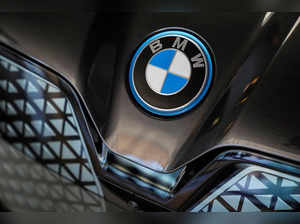
BMW plans to bring its first hydrogen car onto the market from 2028
BMW plans to launch its first hydrogen-powered vehicle in 2028, using fuel cell technology developed with Toyota. The vehicle will be an existing model with a hydrogen fuel cell drive option. BMW expects the hydrogen charging infrastructure to be significantly developed by then to support its plans.
BMW aims to bring its first hydrogen-powered vehicle onto the market in 2028, using fuel cell technology developed with Toyota Motor Corp , the German carmaker said on Thursday.
The company said the vehicle would be an existing model with a hydrogen fuel cell drive option, without giving further details.
It also did not give details on price or production volume.
BMW CEO Oliver Zipse said in a statement the vehicle would "highlight how technological progress is shaping the mobility of the future". Its partnership with Toyota will allow the groups to cut costs and to develop a passenger car drive unit whose technology will also have applications for commercial vehicles, they said.
BMW is by far the strongest proponent of hydrogen technology among German carmakers, and has been testing a hydrogen passenger vehicle, the iX5 Hydrogen, with a range of 500 km (310 miles) and an ability to refuel in three to four minutes.
Artificial Intelligence(AI) Java Programming with ChatGPT: Learn using Generative AI By - Metla Sudha Sekhar, Developer and Lead Instructor View Program Artificial Intelligence(AI) Basics of Generative AI : Unveiling Tomorrow's Innovations By - Metla Sudha Sekhar, Developer and Lead Instructor View Program Artificial Intelligence(AI) Generative AI for Dynamic Java Web Applications with ChatGPT By - Metla Sudha Sekhar, Developer and Lead Instructor View Program Artificial Intelligence(AI) Mastering C++ Fundamentals with Generative AI: A Hands-On By - Metla Sudha Sekhar, Developer and Lead Instructor View Program Artificial Intelligence(AI) Master in Python Language Quickly Using the ChatGPT Open AI By - Metla Sudha Sekhar, Developer and Lead Instructor View Program Office Productivity Zero to Hero in Microsoft Excel: Complete Excel guide 2024 By - Metla Sudha Sekhar, Developer and Lead Instructor View Program Astrology Vastu Shastra Course By - Sachenkumar Rai, Vastu Shashtri View Program Data Science SQL for Data Science along with Data Analytics and Data Visualization By - Metla Sudha Sekhar, Developer and Lead Instructor View Program Web Development A Comprehensive ASP.NET Core MVC 6 Project Guide for 2024 By - Metla Sudha Sekhar, Developer and Lead Instructor View Program Office Productivity Mastering Microsoft Office: Word, Excel, PowerPoint, and 365 By - Metla Sudha Sekhar, Developer and Lead Instructor View Program Marketing Digital marketing - Wordpress Website Development By - Shraddha Somani, Digital Marketing Trainer, Consultant, Strategiest and Subject Matter expert View Program Finance Financial Literacy - TDS, Budget, Income Tax Act, GST, Indirect tax By - CA Rahul Gupta, CA with 10+ years of domain experience, trainer View Program Leadership Business Storytelling Masterclass By - Ameen Haque, Founder of Storywallahs View Program Future of Marketing & Branding Masterclass By - Dr. David Aaker, Professor at Haas School of Business View Program HR & People Management Human Potential and the Future of Employment By - Lynda Gratton, Co-chair of the World Economic Forum Council on Work, Wages and Job Creation, Professor of Management Practice View Program Strategy ESG and Business Sustainability Strategy By - Vipul Arora, Partner, ESG & Climate Solutions at Sattva Consulting Author I Speaker I Thought Leader View Program Finance Financial Reporting and Analytics By - Dr. C.P. Gupta, Professor: Department of Finance and Business Economics, University of Delhi View Program The group is developing fuel cell vehicle prototypes alongside battery ones to hedge its bets depending on which "green" technology becomes dominant.
A fuel cell vehicle uses an electric motor like an EV, but draws power from a fuel stack where hydrogen is separated by a catalyst to produce electricity.
Hydrogen-powered vehicles can refuel quickly and have a long range, but few carmakers have invested in the technology because of high costs and a limited network of fuelling stations.
BMW said it assumed hydrogen charging infrastructure would have developed significantly by 2028 to accommodate its plans.
